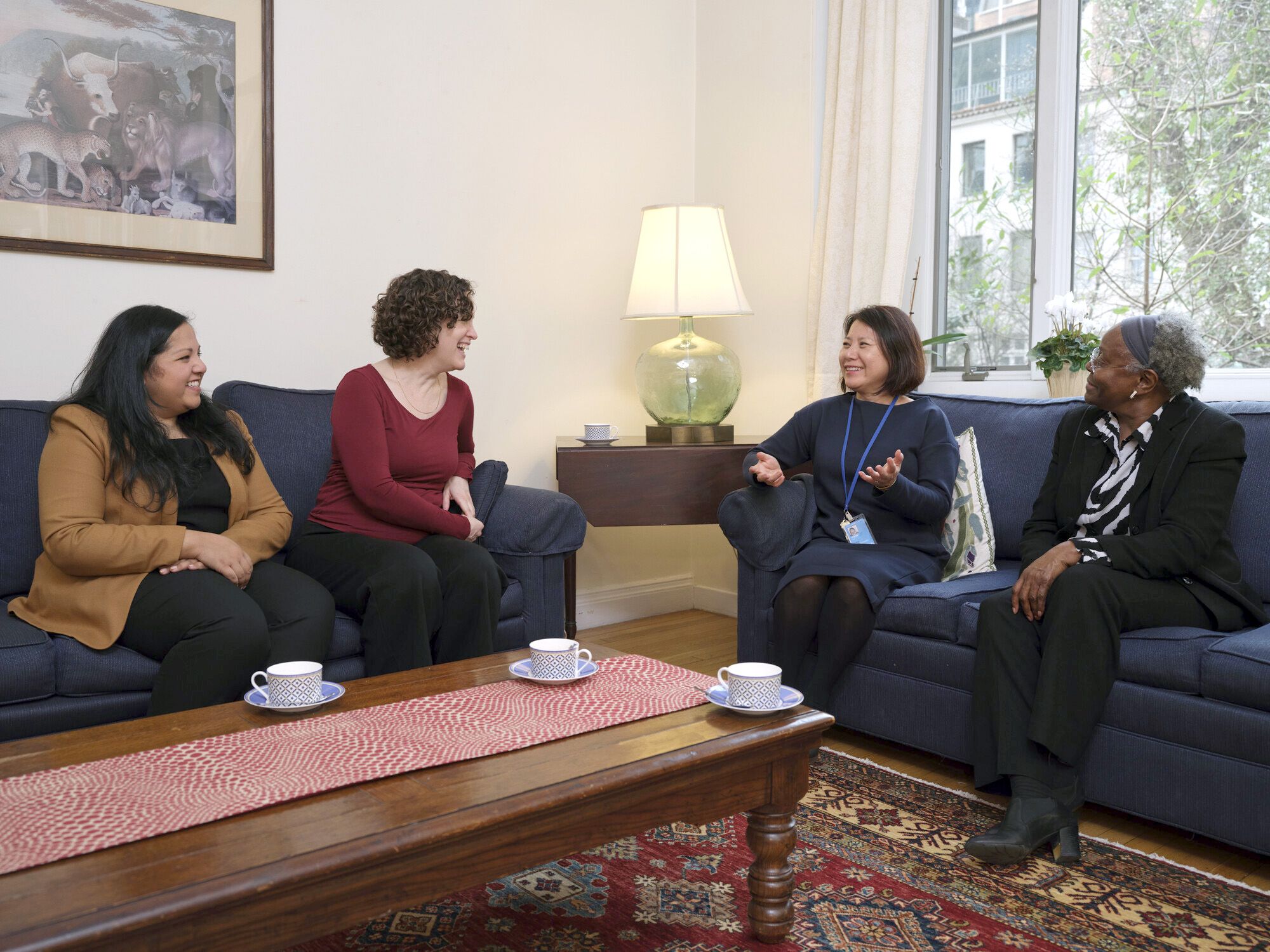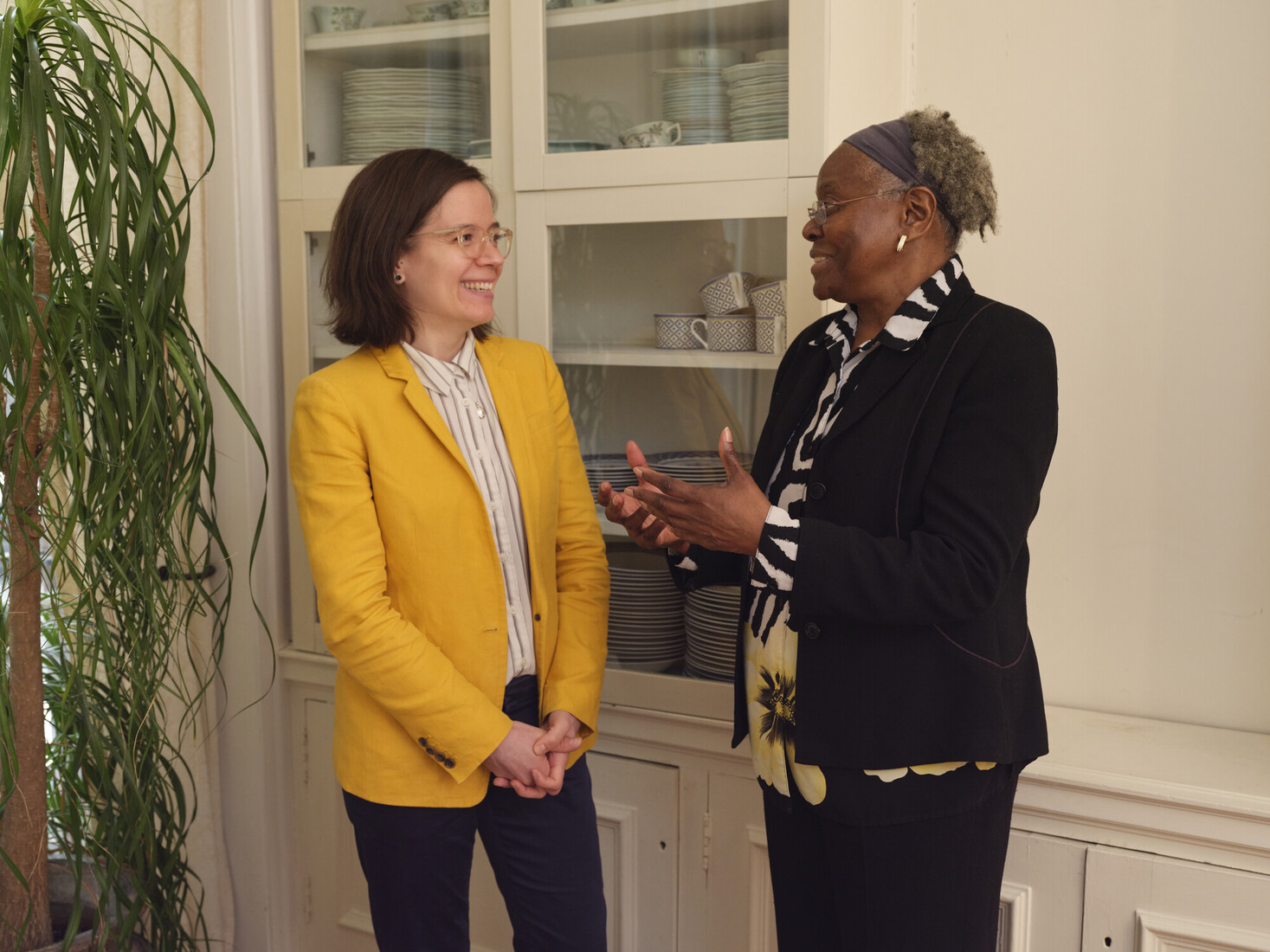
QUNO representatives Kavita Desai and Sarah Clarke (left) welcome guests for discussions at Quaker House. Photo: Guang Xu
In the final days of World War II, world leaders came together to form an international body to prevent future global catastrophes. They established the United Nations (U.N.). Its stated purpose: “To save succeeding generations from the scourge of war, which twice in our lifetime has brought untold sorrow to mankind.”
For generations, Quakers had been actively involved in preventing violent conflict and supporting war relief efforts. They had sent representatives to the League of Nations and supported the founding of the U.N. Now Quakers wanted representation for their concerns for global peace and justice— and to ensure that the voices of local communities were part of policy discussions.
In 1948, Quakers were granted U.N. accreditation, allowing them to carry out their work at U.N. headquarters in New York and directly participate in the meetings and activities of this body. This new office was called, simply, the Quaker United Nations Office (QUNO). Today, there are Quaker offices in both New York and Geneva, which represent Quakers through Friends World Committee for Consultation (FWCC). QUNO in New York receives critical administrative and financial support from AFSC and collaborates on many programs and statements.
Over the years, QUNO staff have worked with diplomats, U.N. officials, and community members to implement the United Nations’ original vision of peace and human rights.
This year, we celebrate the 75th anniversary of QUNO as a shared initiative of the global Quaker community. Here is a look at some of QUNO’s work over the years.
Bringing Community Voices To The U.N.
Much of QUNO’s work is behind the scenes, building trust by bringing together people from a range of backgrounds, including diplomats, U.N. officials, staff of civil society organizations, academics, and community members.
“It’s important that communities play a leadership role in policy discussions that affect them,” says Sarah Clarke, director of QUNO New York. “In many cases, the international community comes in as an outsider and imposes solutions on people. Instead, it should work hand in hand with local communities who already know what the solutions are, but need support— including humanitarian aid, technical assistance, or support with political negotiations.”
In New York and Geneva, QUNO provides quiet spaces—away from formal U.N. meeting rooms—to allow important conversations to take place. In New York City, Quaker House is a setting where people can gather in a comfortable, off-the-record environment. The meeting space is essentially a living room, where people sit in a circle (not at a table) to talk, often over food.
This unique environment “encourages people to gather like human beings, share information they might not have otherwise, and come up with new and creative solutions,” Sarah says. These gatherings have facilitated key conversations at critical moments in QUNO’s history.
One example is the period after 9/11, as the United States embarked on its “war on terror.” Disagreement emerged at the U.N. around whether governments should engage with rebel armed groups, classified by some as “terrorists.” QUNO advocated for dialogue with all parties as the path to peace. A small briefing at Quaker House brought outside experts together with diplomats, including those from countries where armed groups were fighting against the central government.
Over the course of the discussion, participants spoke about challenges facing their countries. One of the diplomats shared their own experience in a mediation effort when a government leader stopped referring to the other side as “terrorists” and instead began calling them “my brothers in the jungle.” This had a transformative effect that allowed constructive conversations to follow.
Another example, Sarah says, is a meeting that took place after the 2007 elections in Kenya. Violence erupted over the disputed results, leaving more than 1,300 dead and hundreds of thousands more displaced. Rumors and misinformation fueled further conflicts.
QUNO brought Dekha Ibrahim Abdi, a Kenyan community leader and nonviolence activist to speak with U.N. officials, diplomats, and others at Quaker House in New York. Dekha Ibrahim Abdi spoke about how peace activists launched a social media and texting campaign to counter misinformation and diffuse violence. The tactic was innovative at the time—and it was working.
“Many of our U.N. partners had only read grim stories in the media about violence between different factions contesting the election—and hadn’t heard about the community-led efforts like this one where everyday people were coming together to create peace,” Sarah recalls. “Using social media was all new 15 years ago. A lot of people in that room there were thinking, how could this be used in other contexts? Now it’s a standard tool to prevent violence when you have a transition of power.”
QUNO’S Quiet, Steady Impact
Long-term persistence is key to QUNO’s work. Through perseverance, QUNO has helped change attitudes, create new understandings, and develop new global standards.
For example, QUNO’s work on girl child soldiers in the early 2000s led U.N. officials to recognize that efforts to reintegrate armed combatants after an armed conflict need to include careful thought about the gender of former soldiers. It shouldn’t be assumed that all child soldiers are boys.
Through attention to disarmament, landmines, and small arms issues, QUNO has underlined the destabilizing impact of the weapons of war. In multiple ways, Quakers have influenced U.N. priorities for peacebuilding on the ground, upholding the value of reconciliation and dialogue across all societies.
QUNO played a key role in the shaping of the 2030 U.N. Sustainable Development Goals (SDGs), a blueprint for achieving a more sustainable future for all. As part of negotiations, QUNO convened diplomats, U.N. officials, and civil society representatives to build global support for including a goal on peace. QUNO’s discussions were effective. Today, one of the 17 Sustainable Development Goals calls on countries to “promote peaceful and inclusive societies for sustainable development, provide access to justice for all and build effective, accountable and inclusive institutions at all levels.”
All 193 U.N. member states have committed themselves to work toward the Sustainable Development Goals. Many countries now voluntarily report on their progress. Others have officially incorporated these goals into planning and policies to better meet the real needs of communities. Progress on these goals can affect whether countries obtain funding from other governments, the U.N., or other sources. And in many places, the Sustainable Development Goal of peace has provided a tool for civil society to demand transparency and accountability from their government.
“The United Nations is at its strongest when all of its member states can come together, even through tensions that exist,” Sarah says. “QUNO plays an important role in bringing people from diverse backgrounds together, helping them see and listen to the perspectives of others, and reaching consensus toward a common goal.”
